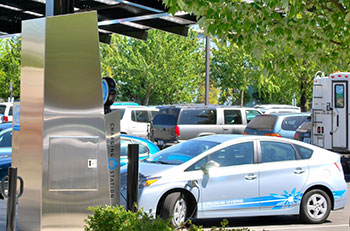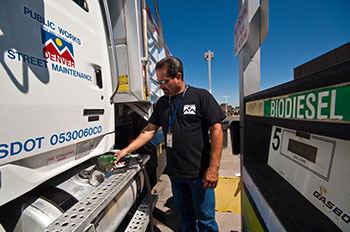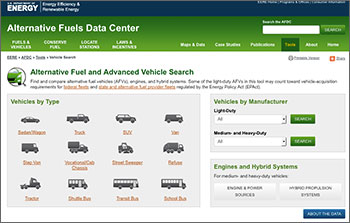EPAct State and Alternative Fuel Provider Fleet Newsletter: Fall 2015
The fall 2015 issue of the EPAct State and Alternative Fuel Provider Fleet Newsletter includes the following articles:
- Annual Reporting Season is Underway: Helpful Hints and Resources
- Earn Credits for Renewable Diesel Use under Standard Compliance
- Coming Soon: Flexible Fuel Vehicles, Benefits and Considerations Online Training
- Alternative Fuels Data Center Updates: Alternative Fuel Vehicle Search and State Information Pages
- Indianapolis Power & Light Company Discovers Alternative Fuels Through EPAct Requirements
- Program Staff Connect with Fleets at Industry Conferences.
Annual Reporting Season is Underway: Helpful Hints and Resources
Model year 2015 reporting is in full swing! All State and Alternative Fuel Provider Fleet Program (Program) covered fleets are reminded that they must submit a report to the U.S. Department of Energy (DOE) by December 31, 2015.
Need a refresher on reporting the credit allocations that were new in 2014? Under Standard Compliance, fleets may earn partial credits for acquiring hybrid electric vehicles (HEVs) and other vehicles that are not alternative fuel vehicles (AFVs), as well as for investments in eligible vehicles and technologies.* In model year 2014, 54 fleets earned partial credits for non-AFV HEVs, non-AFV plug-in HEVs, or neighborhood electric vehicles. Similarly, 35 fleets earned credits for reported investments in alternative fuel infrastructure, alternative fuel non-road equipment, or emerging technologies.

Please join the Program webinar on Tuesday, November 3 to gain insights and view demonstrations about the updated Annual Reporting Tool. Additional information about the webinar will be provided via email to fleet points of contact.
New to the Program? Reporting credentials are specific to each person. Please do not log in using the credentials of your fleet's previous point of contact. Instead, click "Get Started" in the Request New Fleet Access section of the Compliance Tool login page to create your own account. Once you have done so, contact us to have your account linked with your fleet. This will also ensure that DOE sends you a welcome packet with helpful resources explaining the Program and your role in ensuring your fleet's compliance.
Other questions on reporting? Refer to the EPAct website's Frequently Asked Questions for State and Alternative Fuel Provider Fleets or contact us.
* Note that DOE does not allocate credits for funds that a fleet received via a grant or other award.
Earn Credits for Renewable Diesel Use under Standard Compliance
Fleets around the country are using or considering renewable diesel as a substitute for traditional petroleum diesel. Also called "green" diesel, renewable diesel is typically a biomass-derived fuel chemically similar to petroleum diesel, but produced from lipids and cellulosic biomass through various processes, such as hydrotreating (isomerization), gasification, pyrolysis, and other thermochemical and biochemical means.

Under Standard Compliance, fleets can earn biodiesel fuel use credits for renewable diesel used in medium- and heavy-duty vehicles. To be eligible for credit, the renewable diesel must meet the regulatory definition of "biodiesel" laid out in Title 10 of the Code of Federal Regulations, Section 490.702. Specifically, the fuel must be:
- Produced from non-petroleum renewable resources
- Registered with the U.S. Environmental Protection Agency under Section 211 of the Clean Air Act
- Used in medium- and heavy-duty vehicles in blends of B20 or higher.
The amount of credit earned will be based on the percent or quantity of renewable diesel deployed.
Fleets, however, may not double count their fuel use and vehicle acquisitions. That is, if you plan to use biodiesel or renewable diesel in a plug-in hybrid electric medium- or heavy-duty diesel vehicle, the fleet may earn credit only for the vehicle acquisition OR the fuel use—never both. While fleets can choose either option (if eligible), credits earned for the vehicle acquisitions are limited to the model year in which the vehicle was acquired, whereas credits earned for renewable diesel use may be claimed not only in the model year of the vehicle's acquisition but also in all subsequent years that the vehicle using the fuel remains in the fleet, such that counting the renewable diesel use is likely more beneficial from a compliance credits perspective. Please also note that renewable diesel used in light-duty (LD) vehicles may not be counted for biodiesel credit, although the acquisition of a LD vehicle that runs on 100% renewable diesel would earn credit towards compliance.
Coming Soon: Flexible Fuel Vehicles, Benefits and Considerations Online Training
Covered fleets will soon have access to online training that provides a comprehensive review of how flexible fuel vehicle (FFV) acquisitions and E85 use can help meet Program requirements. Whether new to FFVs or weighing the feasibility of using E85 in your existing FFVs, this short online training will review how fleets can make E85 a part of their Program compliance strategy. Also refer to the training for guidance on how to differentiate FFVs from conventional vehicles and find E85 fueling stations near operating locations and along driving routes. Stay tuned for more information.
Alternative Fuels Data Center Updates: Alternative Fuel Vehicle Search and State Information Pages
DOE recently updated several key pages on the Alternative Fuels Data Center (AFDC) to make searching for information easier for users, including covered fleets. One such update is the new Alternative Fuel and Advanced Vehicle Search page. This new tool combines the former Light-Duty Vehicle Search and Heavy-Duty Vehicle and Engine Search into a one-stop shop. Fleets can use this database to identify available AFV models by vehicle category (e.g., sedan/wagon, van, step van), fuel or technology type (e.g., biodiesel, propane), and model year. In addition, the AFDC's updated State Information pages answer the question, "What's happening in my state?" and allow fleets to stay up-to-date on their state's alternative fuel and advanced vehicle laws and incentives, fueling stations, fuel prices, fuel production and consumption statistics, and more.
Indianapolis Power & Light Company Discovers Alternative Fuels Through EPAct Requirements
Indianapolis Power & Light Company's (IPL's) AFVs are integral to managing more than 13,000 miles of transmission and distribution lines that allow IPL to provide power to its central Indiana customers. Although IPL first purchased AFVs to comply with requirements under Standard Compliance, the company soon found that alternative fuels were simply the right solution for its fleet. Using a mix of ethanol, biodiesel, and electric-drive vehicles, IPL recognizes that there is no "one size fits all" solution to reducing its fleet's petroleum footprint. Watch the Case Studies page for an upcoming story with more information on IPL's experiences.
Program Staff Connect with Fleets at Industry Conferences
EPAct Program staff are out and about and eager to meet with covered fleet representatives at industry events. This year, we attended a variety of alternative fuel and fleet management conferences and meetings, including the National Conference of State Fleet Administrators, the National Association of Fleet Administrators' Institute & Expo, the Alternative Clean Transportation Expo, and the Fleet Technology (formerly Green Fleet) Expo. At these events, Program staff met with fleets one-on-one to answer questions about the Program, learn about individual fleet operations, and collect feedback on the Program. Look for us at events this fall and winter. Please contact regulatory.info@nrel.gov or 202-586-9171 if you will be attending industry events or conferences and are interested in meeting with Program representatives.

